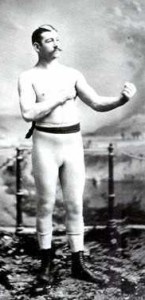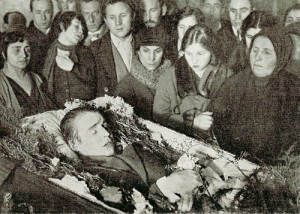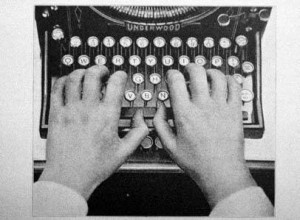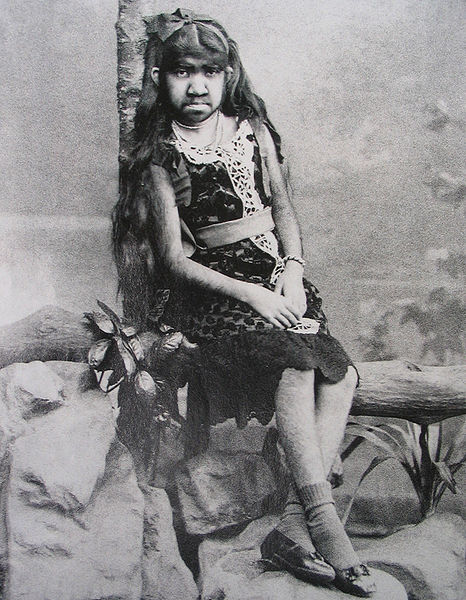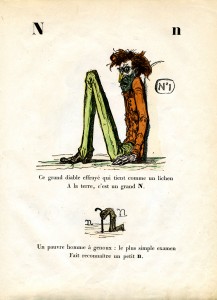In one clip, he smokes a cigar, which may have been just a cigar.
Tags: Sigmund Freud

"I worked with Freud in Vienna. We broke over the concept of penis envy. Freud felt that it should be limited to women."
The twentieth century may have been known as the “Century of the Self,” but it was a time when psychotherapy was ascendant, people were questioning their egos and phrases like “Me Decade” were used in the pejorative. There was a sense of introspection and healing, as wrong-minded as the methods may have been at times, as opposed to the sheer exhibitionism that succeeded it. This century may end up being the “Century of You,” but it still seems to be just another way to say “Me.” And minus the introspection.
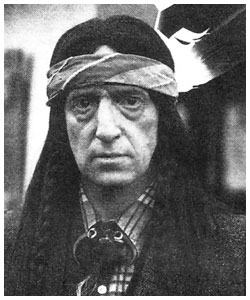 Woody Allen’s pitch-perfect period-piece mockumentary profiles a unique and now-forgotten Jazz Age character, the protean protagonist Leonard Zelig. A man who fears that being himself will lead to unpopularity, Zelig adapts the personas, professions and attitudes of whomever he encounters. In tall tale tradition, he is able to actually alter his physical appearance. When surrounded by heavyset men, his belly distends. In Paris jazz clubs, his skin darkens so that he can play with musicians of color. In Chicago bars, scars suddenly crawl across his face when he rubs elbows with gangsters. The unusual talent allows Zelig to insert himself into a variety of famous historical moments–and eventually lands him in a mental institution, where he comes under the care of Dr. Eudora Fletcher (Mia Farrow). She hopes to cure the chameleon and make her career all at once. Of course, she encounters difficulties since Zelig insists that he’s also a psychiatrist, wanting to resemble her.
Woody Allen’s pitch-perfect period-piece mockumentary profiles a unique and now-forgotten Jazz Age character, the protean protagonist Leonard Zelig. A man who fears that being himself will lead to unpopularity, Zelig adapts the personas, professions and attitudes of whomever he encounters. In tall tale tradition, he is able to actually alter his physical appearance. When surrounded by heavyset men, his belly distends. In Paris jazz clubs, his skin darkens so that he can play with musicians of color. In Chicago bars, scars suddenly crawl across his face when he rubs elbows with gangsters. The unusual talent allows Zelig to insert himself into a variety of famous historical moments–and eventually lands him in a mental institution, where he comes under the care of Dr. Eudora Fletcher (Mia Farrow). She hopes to cure the chameleon and make her career all at once. Of course, she encounters difficulties since Zelig insists that he’s also a psychiatrist, wanting to resemble her.
In a twist, Zelig’s ability to subsume his own ego is what helps sustain him at a vital moment. Despte this stroke of good luck, Zelig continues to find it difficult to walk the fine line between utter conformity and unbridled ego. But at least he was trying.•
Recent Film Posts:
- Classic DVD: Fahrenheit 451 (1966)
- New DVD: Waste Land.
- Classic DVD: Woman in the Dunes (1964)
- Classic DVD: RoboCop (1987)
- Classic DVD: King of Comedy (1982)
- Strange, Small & Forgotten Films: Little Murders (1971)
- Classic DVD: The Passenger (1975)
- New DVD: Dogtooth
- Strange, Small & Forgotten Films: Rivers and Tides (2003)
- Classic DVD: F for Fake (1974)
- New DVD: The Art of the Steal
- Classic DVD: The Man Who Fell to Earth (1976)
- Classic DVD: Fast, Cheap & Out of Control (1997)
- Classic DVD: Umberto D. (1952)
- Classic DVD: The Wicker Man (1973)
- Classic DVD: Blow-Up (1966)
- Classic DVD: Invasion of the Bodysnatchers (1978)
- Classic DVD: The Stepford Wives (1975)
- Classic DVD: Rollerball (1975)
- New DVD: Exit Through the Gift Shop
- Strange, Small & Forgotten Films: Stay Hungry (1976)
- Classic DVD: Westworld (1973)
- Classic DVD: Slacker (1991)
- Strange, Small & Forgotten Films: Decasia: The State of Decay (2002)
- Classic DVD: 32 Short Films About Glenn Gould (1993)
Tags: Mia Farrow, Woody Allen
The first two crisp paragraphs from “A Murder Foretold,” a new New Yorker article about a mysterious killing in Guatemala, penned by the excellent writer David Grann:
“Rodrigo Rosenberg knew that he was about to die. It wasn’t because he was approaching old age—he was only forty-eight. Nor had he been diagnosed with a fatal illness; an avid bike rider, he was in perfect health. Rather, Rosenberg, a highly respected corporate attorney in Guatemala, was certain that he was going to be assassinated.
Before he began, in the spring of 2009, to prophesy his own murder, there was little to suggest that he might meet a violent end. Rosenberg, who had four children, was an affectionate father. The head of his own flourishing practice, he had a reputation as an indefatigable and charismatic lawyer who had a gift for leading other people where he wanted them to go. He was lithe and handsome, though his shiny black hair had fallen out on top, leaving an immaculate ring on the sides. Words were his way of ordering the jostle of life. He spoke in eloquent bursts, using his voice like an instrument, his hands and eyebrows rising and falling to accentuate each note. (It didn’t matter if he was advocating the virtues of the Guatemalan constitution or of his favorite band, Santana.) Ferociously intelligent, he had earned master’s degrees in law from both Harvard University and Cambridge University.”
••••••••••
“Good afternoon, my name is Rodrigo Rosenberg Marzano, and regrettably if you are watching or listening to this message, it’s because I was murdered by President Alvaro Colom.”
Cell phone signal towers kill so many birds every year that it’s time for us to create some artificial birds, so that we”ll have more birds to kill. Singularity Hub posted the attached video of Festo’s Smartbird bot, which is patterned after a seagull and is really quite amazing.
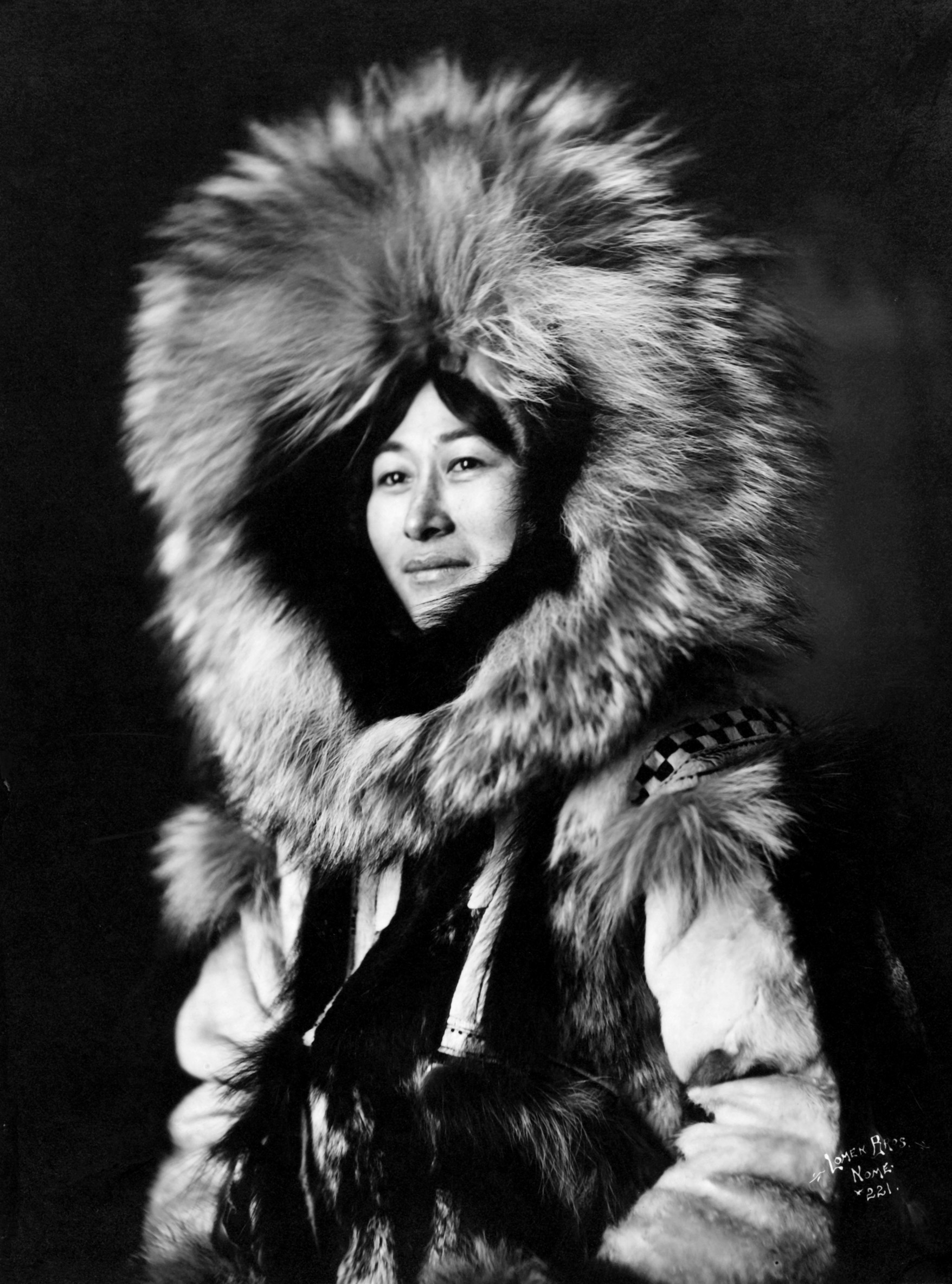
An Inuit woman in Nome, Alaska, 1915, as photographed by the Lomen brothers, who were also in the reindeer meat business.
The above photograph of an Aleut woman is stunning not only because of how beautiful it is but because it was taken in 1915 and seems like it could have been torn from a contemporary fashion spread. The image was shot by the Lomen brothers, Minnesota transplants who made the folkways of Alaska their subjects. A brief bio of the brothers from the Glenbow Museum:
“Carl Lomen, 1880-1965, and his father, Gudbrand J. Lomen, 1854-1934, who were from St. Paul, Minnesota, USA went on vacation to Nome, Alaska, USA in 1900, at the height of the Alaska gold rush. Gudbrand did some legal work there and Carl some gold prospecting, and eventually the two decided to make an extended stay. After a brief period in St. Paul over the winter of 1902-1903, Carl and Gudbrand returned to Alaska to settle. Shortly afterwards they were joined by Carl’s mother, Julie, three of his brothers, Harry, Ralph and Alfred, and a sister, Helen. In 1908 the brothers entered into partnership and bought a photo studio with Harry as manager. Equipment and photos from several Alaskan photographers were purchased for the studio, and Alfred soon became main photographer. A year later the brothers bought a drug store with Ralph as manager. Photos from the studio were sold as postcards, and the images, which included those of Inuit, were in demand for many publications. Ralph also operated a studio in Iditarod, Alaska for a few years. The Nome photo studio was destroyed by fire in 1934. From 1913 to 1934 the Lomens also invested in a reindeer herd and shipped meat to the USA by sea.”
Tags: Lomen Brothers
Ocelot: Usually called the leopard cat, is common in the more southern parts of the United States, in Mexico and Brazil. It is about four feet in length, including tail, and of a gray or tawny color, and spotted. It is very destructive to weaker animals, but does not devour them, contenting itself with sucking their blood.
Octopus: The Devil Fish, a marine cephalopod, differing from squid and cuttle-fish in having eight instead of ten arms, extending from the hideous, one-eyed head.
Optical Illusions: These are frequently occasioned by a disordered condition of the nervous system. They are indicative of brain disturbance. Also optical illusions occur in delirium, caused by alcoholic excesses, fever, or injury. They are the outward sign of inward mischief, which needs very serious attention. Morbid affections of this kind have received much attention by specialists in our day, and much more enlightened methods of treatment are employed now than formerly.
Ostracism: A right exercised by the Athenians of banishing for a time any citizen whose services, rank or wealth appeared to be dangerous to the general good.
Otis, James: (1724-1783) An American Revolutionary patriot, famous for his oratory, and especially celebrated for his speech at Boston, in 1761, in opposition to the so-called “Writs of Assistance.” He was waylaid by Tories and a blow on his head destroyed his reason. He was killed by a stroke of lightning.
•Taken from the 1912 Standard Illustrated Book of Facts.
See also
Advertising Space on my home (New Jersey)
Looking to bring in extra income will rent out, the outside space of my home for Advertisement on the house, (roof) lawn. This could be from 6 months to 1 year, local, state or national business. The fee is something we can talk about. My area gets good foot traffic and other public (car & truck) traffic. Please note, your business must be legal and nothing dealing with sex in any way.
In praise of idleness, from Mark Slouka’s 2004 Harper’s essay, “Quitting the Paint Factory“:
“Idleness is not just a psychological necessity, requisite to the construction of a complete human being; it constitutes as well a kind of political space, a space as necessary to the workings of an actual democracy as, say, a free press. How does it do this? By allowing us time to figure out who we are, and what we believe; by allowing us time to consider what is unjust, and what we might do about it. By giving the inner life (in whose precincts we are most ourselves) its due. Which is precisely what makes idleness dangerous. All manner of things can grow out of that fallow soil. Not for nothing did our mothers grow suspicious when we had ‘too much time on our hands.’ They knew we might be up to something. And not for nothing did we whisper to each other, when we were up to something, ‘Quick, look busy.’
Mother knew instinctively what the keepers of the castles have always known: that trouble – the kind that might threaten the symmetry of a well-ordered garden – needs time to take root. Take away the time, therefore, and you choke off the problem before it begins. Obedience reigns, the plow stays in the furrow; things proceed as they must. Which raises an uncomfortable question: Could the Church of Work – which today has Americans aspir ing to sleep deprivation the way they once aspired to a personal knowledge of God – be, at base, an anti-democratic force? Well, yes. James Russell Lowell, that nineteenth-century workhorse, summed it all up quite neatly: ‘There is no better ballast for keeping the mind steady on its keel, and sav ing it from all risk of crankiness, than business.'”
Hoped he would actually juggle pianos. Still, impressive. (Thanks Reddit.)
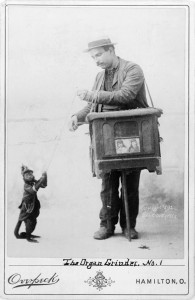
"A swarthy, dust begrimmed Italian organ grinder with a mammoth instrument on wheels drew up in front of the door."
Apart from a thieving monkey, this June 12, 1886 Brooklyn Daily Eagle story had everything: a boarding-house birthday party, an asbestos company employee, an Italian organ grinder, and several jackasses pummeling one another in impromptu prizefights in a parlor. It’s all so deeply funny. An excerpt:
“Yesterday was the twenty-first birthday of Mrs. Conover, the eldest daughter of Mrs. Denice, who keeps a fashionable boarding house at 55 Orange street, in which Mrs. Conover resides. It has been the custom in the Denice household to celebrate such occasions. Mrs. Conover, who shares with her mother the household cares, had made no preparation for her birthday fete, being so fully occupied with other matters that the evening dinner hour had passed before she remembered that she was 21 years of age. Even then she would not have recalled the interesting event had not her 16 year old brother shortly before 8 o’clock mentioned the fact and proposed a birthday party. Of the boarders in the house at the time, Mr. Raymond who is engaged in the twine business at 101 Reade street, New York; Mr. Titus who is connected with the house of Dunlap & Company, the New York hat manufacturers; Mr. Dockam, of the Asbestos Manufacturing Company, New York; Young Mr. Denice, Mr. Ireland and Mr. McIntosh.
When the party had assembled in the spacious parlors they remembered with dismay that Mrs. Fleury, the only pianist in the establishment was absent. A birthday party without music, would they concluded, be like strawberry shortcake without the strawberries. At this juncture a swarthy, dust begrimmed Italian organ grinder with a mammoth instrument on wheels drew up in front of the door, and proceeded to play with more than customary energy ‘St. Anna’s Day.’ Messrs. Raymond, Ireland and Dockam were simultaneously inspired with an idea, and a minute thereafter the son of Italy was in a corner of the parlor turning out popular airs with great rapidity and flourish.
The organ struck up a martial air, and the gentleman’s conversation touched on the possibility of Mitchell beating Sullivan. Then they began to boast of their personal and individual prowess. Young Mr. Denice slipped from the room and shortly reappeared with a set of boxing gloves. Mr. Raymond and Mr. Titus has their coats and vests off in an instant and the boxing gloves on their hands. Mr. McIntosh constituted himself referee and before the ladies were well aware of what was transpiring they were the witnesses of the first class bout. The noise of the hand organ attracted the neighbors and every window of the houses opposite were thrown open and an audience of fashionable dead heads witnessed the fight. A stalwart policeman, who was walking his beat at the time, stopped in front of the house and viewed the organ grinder and boxers with amazement. Four rounds in approved Queensberry style were fought and Mr. Titus was declared the winner. At this point Mrs. Denice entered a protest, saying that the neighbors would think she kept a peculiar establishment. Young Mr. Denice and Mr. Dockam, however, had become involved in a controversy as to their pugilistic merits and they compromised by dismissing the organ grinder. While the ladies were seeing that he took nothing more than the organ with him, Messrs. Denice and Dockam had answered ready to the call of Referee McIntosh.
Dockam led out with his rights, but fell short and received a stunning uppercut in the jaw. He lunged viciously with his left, but missing received one straight from the shoulder between the eyes which staggered him. The first round ended with the honors in favor of Denice. The ladies had become interested and regarded with eagerness the preliminaries for the second round.
This time Dockam was more cautious, and by acting on the defensive and only striking at his adversary when within reach, he succeeded, when time was called, in obtaining a majority of scientific points. The call of time for the third round brought both men to the front, eager to dispose of his antagonist at once. A genuine slugging match ensued, which ended by Referee McIntosh separating the combatants. They retired to their corners and at the expiration of regulation time began again. From the fourth to the fifteenth rounds lively slugging was witnessed. Both men were tired, but eager for business. On the call of time for the sixteenth round Mrs. Denice and her daughter became aware of the fact that what they thought were blushes on the men’s faces were blood stains. They became frightened and immediately protested against the continuance of the mill. It was then half past ten o’clock. The gentlemen shook hands and, wishing Mrs. Conover many happy birthdays, retired to their rooms, ‘Where,’ said Mrs. Denice to an Eagle reporter this morning, ‘I think they had it out. However, it was a really jolly and original birthday party and a surprise to all concerned.'”
Up until that moment when you’re killed, it’s a lot of fun.
Matthew Guay of Techinch recalls the introduction of the microwave oven, which became wildly successful despite being an in-between product, just like tablet computer is in its sector:
“In 1967, American consumers were introduced to the new, must have item for their kitchens: the microwave oven. This device, manufactured mainly by defense contractors such as Raytheon due to their expertise with magnetron, the device that generates microwaves in a radar system or microwave oven, was now supposed to be a fixture in every home, restaurant, and more. It could heat food faster, use less energy, and be less likely to burn your house down than a traditional oven. And it cost just under $500. What more could you ask?
Actually, there was a lot customers could ask. First, why in the world do you need yet another way to heat food? Kitchens already have an oven and range, plus perhaps a toaster, waffle iron, or a grill on the back porch. And the coffee pot can keep coffee hot anyhow. Do you really need another oven? Plus, surely it won’t work quite like an oven, or quite like a stove. It’s like something in the middle. How could we need that?”
Tags: Matthew Guay
I need help getting a death certificate – $100 (NYC)
I am a private investigator in N.C……Im trying to get a death certificate for a client. All I have is the mans name and last address he was at when he died. Its so much crap to go through to get it its crazy. If someone can help and get me the certificate I will send you 100.00 bucks after I get it. This is legit.
French firm Wysips makes a thin film that attaches to phone displays and traps solar energy. Available in 2012.
Some search engine keyphrases bringing traffic to Afflictor this week:
- Classic DVD: Fahrenheit 451 (1966).
- Old Print Articles: Tales from the Flatbush Insane Asylum (1888-96) + Innocent man refuses to leave prison (1896) + Lone lady letter carrier in the Old West (1900).
- Classic Photographs: Fun in the sun at Midland Beach (1890s) + Harry Houdini was the son of a rabbi (1899).
- Featured Videos: Henrietta sings, as does Merna + Leonard Cohen predicts the future will be murder (1993) + Record producer Joe Meek was nuttier than Phil Spector + Effed up Orson Welles selling liquor + Larry King interviews futurist Jacque Fresco (1974) + Ronald McDonald’s daughter in Japan + Great wire walker in NYC (1904) + Perhaps the fakest Bigfoot ever + Cosmonaut dies; it makes for a great song + Opossum pedicure tips + Melancholy instructional video about cleaning bathrooms (1966) + Elizabeth Taylor on What’s My Line? (1954) + Great acrobats from Japan (1904) + Antique footage of Calcutta (1899) + London street life (1930s) + Star Trek theme played on a saw + In praise of the washing machine + The history of communications from the 1800s to 1976 + Exoskeleton suit for senior citizens.
- Recently Posted on NYC’s Craigslist: I’m convinced I’m an artist, so send me a tape of you having sex + Some jerk stole Fletch’s bike + Small guy needs ‘roids + Mom threw out my newspapers + Offering occult store memorabilia + Yu-Gi-Oh! cards are apparently too expensive to purchase + That Spice Girls yo-yo that you’ve been looking for.
- Frank Sinatra had a cold–and a hot temper–in 1965.
- Paul La Farge meditates on the dark side of Utopia.
- That scissors grinder with the trumpet is no joy (1898).
- Gerald Daniel Blanchard is really, really good at stealing stuff.
- Design guru Jonathan Ive conducts unusual research for Apple.
- Ludwig Wittgenstein thought the technological age was the end of humanity.
- Economist Tyler Cowen praises amateurism.
- Puzzle master Henry Hook is an enigma.
- Susan Orlean’s profile of Maui surfer girls from 1998.
- Hollywood children train to be entertainers.
- A look at Larry Page as he assumes leadership of Google.
- Baby food for adults didn’t really catch on.
- This week’s Afflictor keyphrase searches.
Venezuelan performer Juan Caicedo shows his skills.
Caicedo mentioned in a review of Barnum’s circus from an 1883 Brooklyn Daily Eagle: “Juan Antonio Caicedo, a Venezuela artist did some wonderful things upon a wire. His somersaults upon a thin line of steel, so fine as to hardly be discernible, were simply wonderful.”
Tags: Juan Caicedo
The opening of “Hollywood Elementary,” Adrian Nicole LeBlanc’s 2006 New York Times article about children training for a career in show business:
“Nine-year-old Jaysha Patel doesn’t cry easily, but on a recent morning, she was ready to weep. She took a chair facing her fellow actors in a bland conference room. The mothers, who sat in the back, seemed oblivious: one knitted; another placed stamps on a pile of picture postcards of her son, which would alert casting directors to the air date of his latest show. Meanwhile, Trisha Simmons, the children’s very pretty teacher, offered her aspiring students a couple of tips: ‘Short breaths help you to cry. Tightening the throat helps.’ Simmons looked resplendent in a bright purple hooded jacket and a rhinestone belt, circulating among her charges, some as young as 5. ‘Take your finger out of your nose,’ she chided one, then stopped to squint at a boy. ‘What’s that on your lips?’ she asked.
‘Powdered doughnut,’ he admitted.
The workshop, Crying on Cue, was taking place at the Oakwood Toluca Hills, a vast complex of temporary rental apartments in Los Angeles that caters to families actively pursuing a Hollywood career. In addition to housing, the Oakwood offers the Child Actor Program, which brings industry professionals, like Simmons, onto the premises and has made the Oakwood a much-sought-after residence for aspiring child actors. Simmons and others teach specialized, marketable skills: ‘If you’re a kid, and you can cry, you’re going to have a long road ahead of you — lots of work,’ Simmons says. She’s a working actor whose résumé includes roles in Desperate Housewives and Will and Grace.“
I NEED SOME OLD NEWSPAPER (BAYSIDE)
Does anybody have some New York Times, Newsday news paper from the month of January, February that don’t need it.
Please I do need it for a project for school. I had them but my mother trought it away by accident. Now I need it .
Please any help will appreciate. I prefer in the are of Queens but I go anywhere. Or if some people know how can I get this.
Thanks.
Okay.

Tyler Cowen: "Maybe it is stretching the concept, but you can interpret Bill Gates and Steve Jobs as amateurs too."
An excerpt from a post by economist Tyler Cowen on Marginal Revolution about the merits of amateur efforts:
“Amateurism is splendid when amateurs actually can make contributions. A lot of the Industrial Revolution was driven by the inventions of so-called amateurs. One of the most revolutionary economic sectors today — social networking — has been led by amateurs. Maybe it is stretching the concept, but you can interpret Bill Gates and Steve Jobs as amateurs too.
Amateurs are associated with free entry and a lot of experimentation. Barbecue quality is very often driven by amateurs, and in general amateurs still make contributions to food and cooking. The difficulty of maintaining productive amateurs is one of the reasons why scientific progress periodically slows down. Specialization, however necessary it may be, can make big breakthroughs harder at some margin. This is one aspect of the division of labor which Adam Smith did not fully grasp, though he hinted at it.
Through computers, and the internet, the notion of amateurs working together is becoming more important. This includes astronomical searches and theorem-proving, plus collection and collation of data, and Wikipedia; this is Shirky’s ‘cognitive surplus.’”
Tags: Adam Smith, Bill Gates, Clay Shirky, Steve Jobs, Tyler Cowen
Two years before David Bowie released this 1969 promotional video for “Space Oddity,” a Soviet cosmonaut became a casualty of the Space Race. From the BBC: “The Soviet Union has announced the catastrophic failure of its latest space mission, with the crash of Soyuz 1 and the death of the cosmonaut on board. Colonel Vladimir Komarov, 40, is the first known victim of a space flight. He was an experienced cosmonaut, on his second flight, and had completed all his experiments successfully before returning to Earth. But within seconds of landing, just after he re-entered the Earth’s atmosphere, the strings of the parachute intended to slow his descent apparently became tangled. The spaceship hurtled to the ground from four miles up. It is likely that Colonel Komarov was killed instantly on impact.”
Tags: David Bowie, Vladimir Komarov
Naturalization: The process by which an alien acquires citizenship. A naturalized citizen in the United States has all the rights except that he cannot become president or vice-president. By the law of 1906, every alien, on his arrival in the United States is registered, and certificate of registration given him in case he should desire to apply for citizenship. No less than two nor more than seven years after filing this declaration the alien must make petition to a competent court, rehearsing these facts, stating that he is not an anarchist, and that he wishes to be naturalized. He must have two credible witnesses, citizens themselves, who confirm his statement, assert that he has been a resident of the United States for five years and of the state for one, and that he is of good moral character. The petitioner must be able to speak English unless he is naturally dumb, or has a homestead entry on public land. Foreign Africans can be naturalized but not Chinese.
New Surgery: This promises remarkable achievements in the future–even “sight to the blind” and “new life to the heart.” An enumeration of some of the feats already accomplished include: insanity cured, due to neuralgic pain by trephining the skull and taking out the “fifth” nerve; criminals restored to normal life by relieving a certain pressure on the brain: “new” bones formed by transplanting dead or living bones to living bodies; whole joints removed and others put in new places; kidneys transplanted from one animal to another; skin transplanted from the body of one person to another; skin removed from dead or living bodies kept “alive” in the laboratory by chemical means and made to grow; broken backs mended, skulls repaired with bones from some other parts of the body, new faces made, dead nerves supplemented with nerves of animals, useless lungs, kidneys, spleens and stomachs removed; injured hearts, livers and other organs stitched; paralysis and brain failure cured by draining the spine or brain, brittle arteries reinforced with gold wire. By means of electric bulbs and mirrors the interior of the throat and lungs is examined. The New Surgery also provides measures for the amelioration not only of the individual condition, as in the removal of the tonsils and the appendix to prevent serious dangers, but also for the actual betterment of the race itself by the prevention through simple surgical means, of the production of offspring by criminals, as well as by others, who might transmit hereditary physical or other defects. The Rentoul operation for severing the tube conveying the seminal fluid of the male, one that involves merely nominal risk, has been adopted in regard to criminals in this country as, for instance, in Connecticut, and might be adopted by those who, afflicted with hereditary troubles, yet also appreciate the dire effects of tainted heredity upon the race generally. Real relief would come by the instruction of children, in family and school, in the nature of the human body, and the terrible results of vice.
New York City: The greatest city of America and the second greatest of the world. It was founded by the Dutch on Manhattan Island (1613) with a few trading huts. Regular colonization began in 1622. New Amsterdam, as it was called, passed into English hands and became New York (1664), but the Dutch policy of patroonships, or large land holdings with tenant farmers, kept town and colony behind New England and Pennsylvania, until after the Revolution, when the genius of Hamilton, the Clintons, Morris and Livingston laid the foundation for its unparalleled prosperity. Its peculiarity of narrowness and immense length, of crowded population and high land values, developed by unbounded wealth and the possibilities of modern steel construction, have produced on Manhattan Island a new architecture, with towering office buildings and palatial apartment houses, ten to fifty stories high. They darken the densely crowded streets, but have a strange and startling effect of grandeur. Cathedrals and pyramids dwindle at their side. Nowhere is the terrible force of modern civilization so impressed on the daily unconscious thought of man by his inherent necessities. It is a gorgeous, crashing, magic city, robbed of weirdness and grotesqueness by the skill of a modern school of architects, whose variety in design, color and decoration, added to modern resources in building-stone, tinted brick and concrete, never wearies the eye and produces a skyline of impressive splendor. The communications and transportation of the thronging myriads are effected by every device of subway, elevated roads, electric and cable lines; organized ability and achievement, aided by the acquired good sense and good nature of a people accustomed from childhood to its imperial wonders.
Nose: The organ of smell, so placed above the mouth that the odor of whatever is placed therein must be immediately perceived.
Nostalgia: A longing for the old home and friends which in sensitive natures produces melancholia and even death. It appears to be most frequent among mountaineers, including the Swiss, Trolese, Norwegians and Dalmatians.
•Taken from the 1912 Standard Illustrated Book of Facts.
See also





